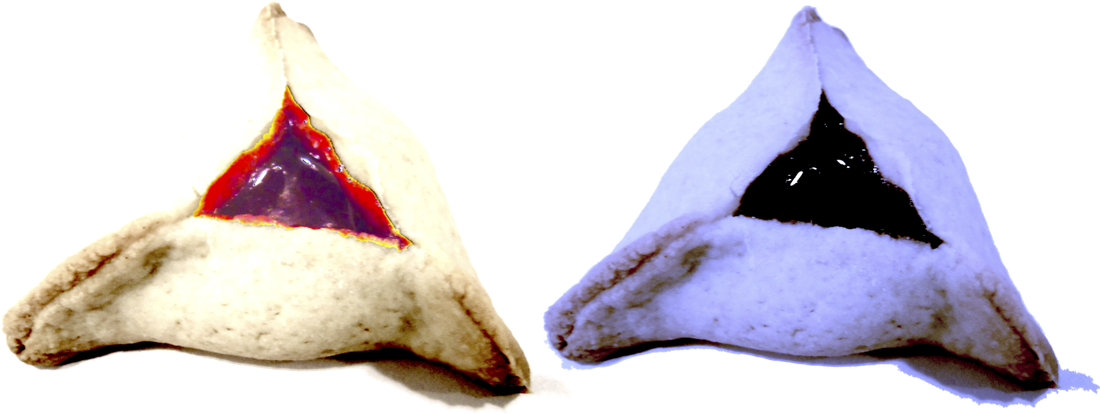The world has suddenly been divided into two groups: the Blue and Blacks and the Red and Whites.
The BBs and the RWs are screaming at each other in shuls, in delis, and JCCs across the globe. The cause of the great debate? Hamantaschen.
Some say that the difference is only a matter of poor lighting, but I say that for Jews at Purim, there is always plenty of light, happiness and honor.
Happy Purim.
 "The cherubs will stretch forth their wings on high, shielding the cover with their wings, and their faces looking at one another…" –Exodus 25:20 "Jews must have two qualities. They must 'stretch forth their wings on high,' always striving upward toward higher levels, and they must have 'their faces looking at one another,' always seeing the distress of others and willing to help." –Sadeh Margalit, quoted in Itturei Torah, 3:215 This has been a painful week, and a hopeful one. In Copenhagen this week, a gunman killed an innocent man at a "free speech" event that featured a cartoonist who had previously drawn a picture of the Muslim prophet Muhammed. He then went to a synagogue and killed another innocent man, a volunteer who stood guard to protect the Jewish community there. In my own community of Rhode Island this week, someone vandalized a Muslim school by spray painting insults on the walls of the building. The primary victims in this case were the innocent children who attend a school that has been noted for its community spirit and kindness. The spray paint on the facade of the Islamic School of Rhode Island already has been washed away, but the fear in the hearts of the school's children will stay within them for as long as they breathe. The life of Dan Uzan, the 37-year-old volunteer murdered in Copenhagen, is gone forever. The tears and heartache of his family and community also are etched on their souls for lifetimes. These crimes were the product of hatred, a refusal to see another human being as anything but an enemy. In such eyes, even a child appears to be worthy of any pain that can be inflicted upon him or her. But this is not the Jewish way of seeing human beings. At the center of the holiest place in the world, we learn in the book of Exodus, there is a throne upon which rests the Presence of the Blessed Holy One. Judaism does not countenance anything like a graven image to represent God, so what did the ancients Hebrews put in the place of the throne? In the Holy of Holies, they put a golden box containing words of Torah that taught them all human beings are created in the image of God. On top of the box, they placed two golden cherubs with their wings outstretched and their faces looking at one another. This teaches us that we should always lift ourselves beyond the limitations we experience in life. It teaches us that we should always be willing to look into the face of others and see their humanity. In response to the attack on the synagogue in Copenhagen, Muslims in the Norwegian city of Oslo this week are surrounding their community's synagogue on Shabbat in a gesture of protection. They are lifting themselves up from their fears and looking into the faces of Jews and seeing their own Norwegian brothers and sisters. Here in Rhode Island, a broad coalition of faith leaders from the Christian and Jewish communities came together the day after the vandalism of the Muslim school to vow their support and symbolic protection. I know that there are people in the Muslim community and in the Jewish community who fear that supporting members of another faith will put them at risk. Those are reasonable fears. There are people who will question whether it is their role to support members of a different faith that has not always been so friendly to them. That is also reasonable. The higher truth, though, is that it is exactly at moments like this that we should spread out our wings and strive to be our best. We are at our best, as human beings, and as Jews, when we are willing to look into the face of another and to recognize the image of God.  This week in Alabama, there was a strange case of judicial disagreement in which the chief justice of the state Supreme Court tried to overrule a federal court judge on the interpretation of the U.S. Constitution. That sort of thing is not supposed to happen in the American legal system. On questions of federal law and the Constitution, federal courts are supposed to trump state courts, even if the state court is the highest court in the state. Chief Justice Roy Moore of the Alabama Supreme Court stated this week that his state does not need to follow a ruling by a federal court that throws out Alabama's prohibition on same-sex marriage. Chief Justice Moore's decree seemed to fly in the face of an American judicial system that has clear rules about which courts have superior authority over others. His statement may even be seen as a threat to the integrity of the American judicial system. Calling on people to ignore a court ruling is dangerous business. Courts are one of the institutions that keep our society functioning. Jewish tradition gives courts in a very honored status for just that reason. Surely, you have noticed the high regard that laws and legality have in Jewish tradition. Our central sacred book, the Torah, is often called the "Written Law" in Jewish tradition (as opposed to the "Oral Law" of the Talmud and rabbinic teachings). Discussing and arguing about law is one of the central ways that Jews and Jewish tradition explore our relationship to God, our obligations to other people, and the meaning of our lives. No wonder there are so many Jewish lawyers. This week's Torah portion, Mishpatim, includes several laws regarding the conduct of judges and the legal system. The Torah teaches: You shall not curse (God / a judge) and you shall not speak an imprecation against a leader of your people… You shall not give false reports, and do not conspire with the wicked to be a malicious witness. Do not chase after the majority to do wrong, and do not give misleading evidence in a dispute to support the strong. Nor should you surgar-coat the position of the weak and poor in his dispute. – Exodus 22:27, 23:1-3 This section of the Torah portion is clearly talking about courts, judges and legal systems. The law, says the Torah, must be respected, it must be fair, it must be treated with sanctity, and it must be just to all. That seeming clarity is what makes the ambiguity ("God / a judge") in the first verse so interesting. The Hebrew word for the entity that must not be cursed is familiar and common in the Bible. The word, Elohim, is usually taken to mean "God." However, the great Torah commentator Rashi makes it clear that the word often has another meaning. For example, earlier in this week's Torah portion, there is a law that says that if a slave wishes to stay with his master after his term of servitude has ended, "His master must take him to the Elohim." It could be that the slave is taken before God, but that doesn't really make sense in the context. What seems more likely is that that slave is brought before a panel of judges who must decide if the master has pressured the slave into remaining in servitude, or if he actually wants to stay a slave. The word "Elohim" as Rashi explains, sometimes means "judges." If we return to the passage about not cursing Elohim, we see a delicious double meaning to the verse that Rashi noticed in the eleventh century. According to Rashi, the phrase, "You shall not curse Elohim," means two things simultaneously. Rashi says, "Behold, this is a prohibition regarding cursing God and a prohibition against cursing a judge." It works both ways. Why? Rashi could have said that, in this context, the word Elohim should only be read to mean "judge" since the passage is all about judges and courts. But Rashi felt that both readings make sense because, in a way, treating God with respect is the same as treating a judge with respect. In the Jewish legal system, laws come from God and they are interpreted and administered by human beings. The legal system depends upon the respect that human beings have for God's law, but it also depends upon respect for those people who have been charged with applying the laws to actual cases and disputes. Curse a judge, and you are cursing God. Curse God, and you are cursing those who serve as judges. This is why the Talmud teaches, "Any judge who gives true judgement truthfully – even if it is for just a single hour – is regarded by Scripture as if he were a partner with the Holy Blessed One in the act of creating the world" (B. Shabbat 10a). Judges who do their job with integrity are God's partners, necessary for God's laws to enter the world and for God's plans for the world to work as they are intended. Today it seems that the question of same-sex marriage in Alabama has been settled. Few courts and magistrates are heeding Chief Justice Moore's call to ignore the ruling of the federal court, and that is probably a good thing. When courts are cursed, God is cursed, and, perhaps, our entire society is cursed. When the rule of law is obeyed, when courts are respected and honored, we are all blessed. And God is blessed. |
WelcomeThis blog is about living a joyful Jewish life and bringing joy to synagogues and the Jewish community. Join the conversation by commenting on posts and sharing your experiences. For more on the topic, read the First Post.
Recent PostsPurim & COVID-19
The Honor of Heaven Chasing Our Own Tails Drilling Under Your Seat Change the World Self-Righteousness Where We Came From What We Must Believe Is Passover 7 or 8 Days?Origin Story Va'eira: Leadership Jeff's Favorites• First Post
• Searching for How the Bible Defines Marriage • The Difference between God and Religion • In the Beginning of What? • Rape, Abortion and Judaism • Ten Thoughts about Being a Rabbi • Temple Dues and Don'ts • A Pesach Lesson from Yoga • The Purpose of the Torah Torah PortionsGenesis
Bereshit Noach Lech Lecha Vayera Chayei Sarah Toledot Vayetze Vayishlach Vayeshev Miketz Vayigash Vayechi Exodus Shemot Va'eira Bo Beshalach Yitro Mishpatim Terumah Tetzaveh Ki Tisa Vayakhel Pekudei Leviticus Vayikra Tzav Shemini Tazria Metzora Acharei Mot Kedoshim Emor Behar Bechukotai Numbers Bamidbar Naso Beha'alotecha Shelach Korach Chukat Balak Pinchas Matot Masei Deuteronomy Devarim Va'etchanan Ekev Re'eh Shoftim Ki Tetze Ki Tavo Nitzavim Vayelech Ha'azinu Vezot Haberachah Holidays Shabbat Rosh Chodesh Pesach/Passover Omer Period Yom HaShoah Yom HaZikaron Yom Ha'atzma'ut Pesach Sheini Lag B'Omer Yom Yerushalayim Shavuot Fast of Tammuz Tisha B'Av Tu B'Av Rosh Hashanah Days of Awe Yom Kippur Sukkot Hoshanah Rabbah Shmini Atzeret/ Simchat Torah Chanukah Tu BiShvat Adar (Joy Increases!) Purim Archives
October 2023
Loading
|


 RSS Feed
RSS Feed
